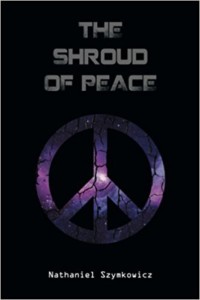Title: The Shroud of Peace
Author: Nathaniel Szymkowicz
Publisher: XlibrisUS
ISBN-13: 978-1-5434-1388-5
Pages: 196
Genre: Science Fiction
Reviewed by: Jason Lolus
Pacific Book Review
Nathaniel Szymkowicz’s novel, The Shroud of Peace, explores the complexity and never-ending residue of war in an action-packed intergalactic scenario set far into the future. Lovers of militaristic, space-themed science fiction will find a lot to enjoy with this book. The story follows two strong characters, Dutch and Mitchell, who are ongoing adversaries, both of whom seem to want personal and universal peace. Dutch is the accomplished soldier and Mitchell is the mythically gifted amnesiac. The reader learns with Mitchell (as he recovers his memory and information about his violent, troubled past) of the ongoing, intergalactic cold war that is actually still quite hot.
Mitchell is the more interesting character because of his mysterious past and his supernatural abilities. These elements bring to mind The Manchurian Candidate, Total Recall, and even the Jedi-like abilities in the Star Wars universe. But with the technological and genetic components, one can’t help but think more along the lines of the idea of the Singularity: when human and computer merge to become more powerful and intelligent. Along with Mitchell’s physical abilities, he is aided by TIM, a sentient program that fills him with information and manipulates others to aid in Mitchell’s wandering quest. TIM is the comic relief, a sarcastic HAL (2001: A Space Odyssey), in an otherwise violent series of events. One of the other interesting themes is the uncertainty of the villain. To be sure, I was inclined to root for one or both of the main characters, but with so many firms and alliances, the author seems to be suggesting the notion of good vs. bad (in war) is necessarily unclear. Also the author clearly makes it a point to show even when one side “wins” a war, destruction results and the book is never fully closed.
This is certainly a dystopia, a military-based tale, complete with an ongoing slew of acronyms which might bewilder the unprepared reader. However, there is much more in the story that will override any preoccupation with military jargon: complex and conflicted characters, defectors, mythic qualities, the media spin of war, and even romance. The allusions to Greek myth highlights the theme of advanced civilizations and technologically aided human evolution: they are like gods. But the author also comments on the danger of such advanced weapons of mass destruction, even in human form. So, the soldier is romanticized but at least somewhat deconstructed. For some, the action might highlight this novel. For me, these technological and mythological themes are more fascinating and I hope to see more of them as it seems this story is to be continued in further volumes.


